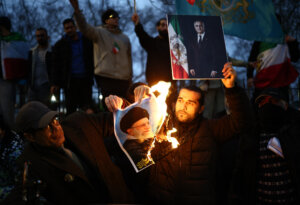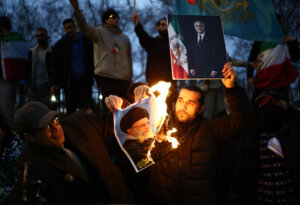Uncategorized
Message from Israel: A Different Planet

By ORLY DREMAN Prepare yourselves and your tissues before reading. Before they go into battle, our soldiers are asked to write farewell letters to their loved ones in case they will not return.
They write that they do not regret anything and if they die then it is for their country. They ask their relatives and friends to remain happy, to be good people and to touch hearts and celebrate life. They thank their parents for the values they instilled in them and how it fulfills them to participate in saving the country. For them family and friends are everything and they wish the tragedy will make them stronger people.
Three weeks ago we experienced the “Entebbe” operation over again with the heroic rescue operation of four hostages, among them Noa Argamani whose picture at the moment of being brutally kidnapped by Hamas became world famous. T.V broadcasters were drowning in their tears. The rescuers were worried that the women in captivity might be pregnant and were ready to bring back a mother and a baby because nine months have passed and we don’t know how many of the young women who were raped gave birth and are still alive. We so needed that rescue day and when the lifeguards on the beaches announced the good news live, the crowds were overwhelmed and cheered loudly. It was a day of national pride. There is no recovery for any of us if we do not bring them all home. There are still one hundred and twenty hostages in Gaza, maybe fifty are alive. At least we do not have any more holidays till Rosh Hashana in October, since it is very difficult to go through a holiday when they are not back home. The hostages were moved from place to place and when they were notified that they are to move again they were scared because they had already become accustomed to it. One weekend we had great happiness and the following weekend we had a dozen killed. Several weeks earlier a few bodies of hostages were also returned by heroic actions of our soldiers. It feels absurd to say those families received a grave “as a present” since it was not obvious that the bodies would be brought back. The mood in the country changes instantly as it does when the sun sets on Memorial Day and then immediately we start celebrating Independence Day.
Some of our friends tried to take a trip abroad “to breath a little”, but they were not able to enjoy themselves. They felt as if they were on a different planet. To illustrate, a friend of mine took a trip to Thailand, when a British tourist heard her speak Hebrew she was brutally beaten.
After the Holocaust the revenge was to build a country. Now we should build a big and strong south and be united. We have what our brethren the Holocaust survivors could only dream about- a country and an army of our own. The survivors chose to look forward. With the loss, the bereavement and the orphanhood they chose to build a new life. I hope our people can imitate them. Thousands of Holocaust survivors experienced Oct 7t.h. They had more emotional strength than the youngsters at the Nova festival or the kibbutzim.
The Hamas wants us all dead. We give them a finger they want the whole hand. If two months ago they were ready to accept just the end of the war, now they are back to their original goal that Israel will cease to exist. They still want to burn us, murder us and dance on our grave. Seventy percent of the humanitarian aid given to Gazans the Hamas steals, which leaves their needy citizens with only thirty percent. They also threaten that they will not receive food and medicine unless they join them in their military struggle. Therefore, it is not surprising the four rescued hostages were found in the homes of both a doctor and a journalist. If Hamas wants a cease fire they must return our hostages. Unfortunately, they indoctrinate their children to hate all Jews and to want to exterminate them.
Many Israelis have dual citizenships but they do not leave the country. We love our country. We are patriots and loyal.
Whenever a baby is born, at the Brit we bless the child that by the time he grows up he will not have to go to the army. I desperately have to say that we cannot keep this promise. We live in chaos, desperation and fear. This country is facing collapse. We are bankrupted in every area. We are facing an existential threat led by Iran that also supplies Hezbollah, Hamas, the Hutim in Yemen and the Shias. Their plan is to carry on a war of attrition for some years until they destroy us. How do you fight a guerrilla warfare against an ideologically armed body? It resembles how the Americans were in Iraq 20 years ago and had believed they accomplished their mission but a democracy was never established there. The Hamas is surviving even though they were badly hurt and they are still the landlords in Gaza. Some of the residents of the south were told they could return home like in “Shderot” (2 miles from the Gaza border), but they are still suffering from artillery just as they did for dozens of years even before Oct 7th. They drive with their car windows open so they can hear the sirens. They feel cheated; where is the victory they were promised? Let’s face it: We will not attain “complete victory”.
In the north for nine months now Hezbollah has been the main threat to Israel….burning the north of the country with hundreds of missiles each day. Tens of thousands of Israelis will not be able to return home even when the hostilities are over because their homes, farms and businesses are destroyed. Small animals do not survive the fires and the bigger ones can run but have no food since almost all the forests are burned down.
In addition, there is the problem of education with the pupils in the north who were not evacuated. They studied under sirens – running to shelters. It was a lost year. Parents do not know where to register their kids for school in September…- to the place they were moved or will they be moved again? The teachers and students experienced major losses. The main goal of the present educational system is not academic right now, but to build personal and community strength.
In the West Bank we see daily parades of armed terrorists creating havoc, trying to reach our populated centers half an hour away and they are dealt with. There is Iranian money flowing to those areas -meant to promote attacks against civilians.
On the international level- the U.N deliberately falsifies the facts. They report tens of thousands less humanitarian supplies going into Gaza than what really does.
What “land” are they fighting about? When was Palestine born? Did it have currency, history, a leader? The answer to all the above is NO. They are not fighting over land, it is their ideology to kill all the Jews.
I would like in this context to mention the bereaved grandparents who built the country, fought in its wars in order to provide their descendants a safe place. However, the nightmare occurred and left these grandparents broken hearted.
On Oct 7th three of my cousins who lived far away from the kibutsim on the Gaza border heard what happened, immediately took their M16s and drove to kibbutz Beeri. They fought against the terrorists for many hours and saved 100 residents. The three did not live there, they were not called for duty but volunteered. Menachem and Itiel received the Israeli Prize in the name of their brother and uncle Elchanan who was one of the three who fought, but did not survive. In the prestigious ceremony for the Israeli prize speech Menachem said:” We believe in our way, together we shall continue this wonderful journey of the Jewish people because we deserve it.”
All those pro-Palestinian young Western supporters of Hamas do not understand that they are exploited. At the end the Palestinians will get rid of them too since Jihad wants to exterminate all the infidels who are not Muslims, including Christians, Buddhists, Hindus etc. One could ask why are these Westerners not fighting for women’s rights in the Muslim countries… women who get murdered for not covering their faces completely or not obeying their husbands.
In spite of the turmoil prevailing in Israel today, the apartment market in Israel has risen 82% because Jews in the diaspora are beginning to feel the anxiety of antisemitism. They feel Israel is safer than the diaspora.
To conclude, we are strong and have resourcefulness in extreme situations even though we have differences of opinion. I believe we are an eternal nation and we shall not give up.
This has proven to be true for thousands of years, where the Jewish people even when they did not have a homeland prevailed despite centuries of antisemitism and oppression.
Your job North American Jews, is to invite your non Jewish friends to stand with the Jewish people internationally and in Israel.
Uncategorized
Reza Pahlavi, Iran’s exiled crown prince, has a plan for his people’s future — if they’ll have him

With a U.S.-Israel bombardment underway and President Trump and Prime Minister Benjamin Netanyahu openly pressing for regime change, related questions now loom large: What are the Iranian people prepared for — and who, exactly, is positioned to lead them if the Islamic Republic falls?
Since late 2025, anti-regime protests have spread across Iran, resulting in mass arrests, imprisonments, and thousands killed in crackdowns by regime forces. On January 14, following massive demonstrations, President Donald Trump posted on Truth Social, addressing Iranian protesters: “KEEP PROTESTING – TAKE OVER YOUR INSTITUTIONS!!!… HELP IS ON ITS WAY.” At the time, expectations were high for a U.S. strike on Iran, and thousands of protesters were killed in the streets, hoping that help would come. Now, over a month later, Trump appears to have made good on that promise.
Early on Feb. 28, U.S. and Israeli forces began operating across Iran in what the IDF described as a “close and unprecedented cooperation between the IDF and the US military.” Trump and Netanyahu both made statements indicating that the objective of the joint operation extends beyond military deterrence and toward regime change.
Since the start of the operation, the U.S. and Israel have targeted several sites that go far beyond the aims of the 12-Day War, which primarily focused on degrading Iran’s nuclear and ballistic missile capabilities. In this round of strikes, regime assets and figures have been targeted, including Supreme Leader Ali Khamenei, who was killed by an Israeli strike. During the 12-Day War, the US reportedly instructed Israel not to target the Supreme Leader.
Israeli officials say they eliminated several other top officials, including the commander of the Islamic Revolutionary Guard Corps (IRGC), the commander of the Iranian Armed Forces, the Iranian Minister of Defense, and the head of Iranian Intelligence.
Videos have circulated on social media showing Iranians cheering on the attacks, even as reports indicate that the regime has shut down the internet and is jamming satellite signals from diaspora news channels that would otherwise provide critical information about the strikes.
Chants heard across Iranian cities include“death to Khamenei” and “long live the Shah.” Other videos display Iranians honking their cars and chanting “Azadi,” the Farsi word for freedom, dancing in the streets, and gleefully laughing while watching a plume of smoke rise from Khamenei’s residence.
Still, the killing of senior officials — even the Supreme Leader — does not automatically translate into regime change. Even if Ali Khamanei’s death and that of other senior Iranian officials destabilize the clerical regime, there remain 1 million members of the Revolutionary Guard militia and 200,000 members of the IRGC who play a vital role in propping up the government.
Reza Pahlavi, potential leader?
Former Iranian Crown Prince Reza Pahlavi, who lives in the United States, has emerged as one of the most visible opposition figures.
Since January, videos have surfaced on social media showing Iranian protesters calling for the return of the Pahlavi dynasty, which ruled Iran until the 1979 Islamic Revolution. Videos show demonstrators chanting pro-monarchy slogans or displaying the pre-revolutionary Iranian flag. After Pahlavi publicly called for mass mobilization of protestors earlier this year, the demonstrations escalated, with some protestors holding up photos of him in the streets.

The son of the former Shah, Pahlavi was born in Tehran in 1960. He was formally named Crown Prince at age 7 during his father’s coronation. At 17, he became one of the youngest licensed pilots in Iran before leaving for the US to pursue advanced flight training. While he was abroad, the 1979 Islamic Revolution overthrew his father and abolished the monarchy, turning what was meant to be a temporary study into permanent exile. He has not returned to Iran since.
Today, Pahlavi lives in Maryland with his wife and three daughters, one of whom married a Jewish businessman last summer. He has positioned himself not as a monarch-in-waiting, but as a potential transitional leader. He has repeatedly stated that he does not seek to restore the monarchy, instead advocating for a secular, democratic system. U.S. officials have taken notice: following renewed unrest in January, he reportedly met with Steve Witkoff, top Middle East advisor to Trump.
Behind Pahlavi is a network of advisers drawn largely from the Iranian diaspora, including academics, private-sector executives, and professionals with experience in US government institutions. Some serve in formal roles, while others function as informal advisers. His main organizational platform is the National Union for Democracy in Iran (NUFDI), a Washington-based organization that has for years promoted regime change in Iran with Pahlavi’s support. Under NUFDI, Pahlavi and his team developed the Iran Prosperity Project, a governance blueprint intended to guide the country through a post-Islamic Republic transition.
On the eve of the joint U.S.-Israeli operation, Pahlavi unveiled an updated version of his transitional plan. The document outlines Iran’s urgent priorities during the first six months following a potential regime collapse.
About two hours after the initial strikes in Iran, Pahlavi posted a video to X, encouraging Iranian forces to abandon the regime and telling the Iranian people that he will “announce to you precisely” when they “can return to the streets for the final action.”
His prospects remain contested. Analysts have long questioned whether a figure who has lived outside Iran for nearly five decades can command broad domestic legitimacy. Reliable polling inside Iran is difficult, but Dutch pollster Ammar Maleki has found that roughly one in three Iranians expresses confidence in Pahlavi based on large-sample surveys conducted in recent years. At the same time, a similar proportion strongly oppose him. Nonetheless, Maleki asserts, no other opposition figure approaches his level of name recognition.
Pahlavi is also openly pro-Israel. He has traveled to Israel, prayed at the Western Wall, met with Netanyahu, and advocates for expanding the Abraham Accords into what he calls “Cyrus Accords” between Israel and a future Iran, describing the two nations as the “only two countries on this planet that can claim to have a biblical relationship.” Because of his pro-Israel stance, some detractors frame his potential leadership as aligned more with Western and Israeli interests than with those of the Iranian people.
However, in recent months, experts have increasingly framed him as a viable option — or at least as an integral part of the current protest movement that should not be ignored.
The post Reza Pahlavi, Iran’s exiled crown prince, has a plan for his people’s future — if they’ll have him appeared first on The Forward.
Uncategorized
Iranian Leader Khamenei Killed in Strikes, Israel Says

Iran’s Supreme Leader Ayatollah Ali Khamenei speaks during a meeting in Tehran, Iran, Jan. 3, 2026. Photo: Office of the Iranian Supreme Leader/WANA (West Asia News Agency)/Handout via REUTERS
The United States and Israel launched the most ambitious attack on Iran in decades on Saturday, and Israel said Supreme Leader Ali Khamenei had been killed in the operation.
Khamenei’s body has been found, a senior Israeli official told Reuters. Iranian news agencies Tasnim and Mehr, however, reported that the supreme leader was “steadfast and firm in commanding the field.”
Iran called the strikes unprovoked and illegal and responded with missiles fired at Israel and at least seven other countries, including Gulf states that host U.S. bases.
US President Donald Trump, who made the biggest foreign-policy gamble of his presidency after campaigning for reelection as a “peace president,” said the strikes were aimed at ending a decades-long threat from Iran and ensuring it could not develop a nuclear weapon.
Trump called on Iranian security forces to lay down their weapons and invited Iranians to topple their government once the bombing ended.
The US president later on Saturday told NBC News that “most” of Iran’s senior leadership has been killed. He said he believes reports of Khamenei’s death are accurate. “We feel that that is a correct story,” Trump told NBC News in a phone interview, according to a report on its website.
Israeli Prime Minister Benjamin Netanyahu said there were many signs indicating Khamenei “is no longer” and called on Iranians to finish the job. He said Khamenei’s compound had been destroyed, and Revolutionary Guard commanders and senior nuclear officials had been killed.
Three sources familiar with the matter said Iranian Defense Minister Amir Nasirzadeh and Revolutionary Guards commander Mohammed Pakpour were killed in the Israeli attacks. Iranian media had said Khamenei’s son-in-law and daughter-in-law were also killed.
‘WE ARE TERRIFIED’
In cities across Iran, explosions caused widespread panic.
“We are scared, we are terrified. My children are shaking, we have nowhere to go, we will die here,” mother-of-two Minou, 32, said weeping as she spoke to Reuters by phone from the northern city of Tabriz.
Iran responded by launching missiles at Israel and at several Gulf Arab countries that host US bases.
After confronting hundreds of Iranian missile and drone attacks, the Pentagon said there were no US deaths or injuries.
The US military named the campaign Operation Epic Fury.
Iran issued a warning that the Strait of Hormuz, the narrow passage through which around a fifth of global oil consumption passes, had been closed. Traders expected a sharp jump in oil prices. Airlines canceled flights in the Middle East.
Tehran promised a stronger response to come, with a senior Iranian Revolutionary Guards commander, Ebrahim Jabbari, saying it had so far used only “scrap missiles” and would soon unveil unforeseen weapons.
The U.N. Security Council was due to meet in New York on Saturday. Secretary-General Antonio Guterres called for an immediate cessation of hostilities.
Israel‘s military said some 200 fighter jets had completed the largest flying mission in its history, hitting 500 targets throughout Iran including strategic defense systems already damaged in strikes last year.
A girls’ primary school in the southern Iranian town of Minab was hit, killing 85 people, according to the local prosecutor cited by state media. Reuters could not independently confirm the reports. Israel‘s military did not immediately respond to a request for comment.
TRUMP SAYS ‘BOMBS WILL BE DROPPING EVERYWHERE’
In a video message on social media, Trump cited Washington’s decades-old dispute with Iran and Iranian attacks, dating to the seizure of the US embassy in Tehran during the 1979 Islamic revolution.
Trump said the aim was “eliminating imminent threats from the Iranian regime.” He urged Iranians to stay sheltered because “bombs will be dropping everywhere,” but added: “When we are finished, take over your government. It will be yours to take. This will be probably your only chance for generations.”
But he faced pushback from opposition Democrats, and a few of his fellow Republicans in the US government, who said a prolonged campaign against Iran would be illegal without congressional approval and that lawmakers should vote within days.
Netanyahu said the joint US-Israeli attack “will create the conditions for the brave Iranian people to take their destiny into their own hands” and “remove the yoke of tyranny.”
Iran’s clerical leaders were already in a difficult position after mass anti-government demonstrations in January, which led to a crackdown in which thousands of people were killed in the worst domestic unrest since the era of the 1979 revolution.
Protesters had again taken to the streets in recent days in remembrance of those killed the previous month.
Israeli military operations over the past two years had already killed some of Iran’s senior military officials and severely weakened several of Tehran’s once-feared proxy forces across the Middle East.
After Israel pounded Iran in a 12-day air war in June joined by the United States, the US and Israel had warned that they would strike again if Iran pressed ahead with its nuclear and ballistic missile programs.
The threats were backed up recently by a US military buildup in the region, even as Iranian and US officials held nuclear talks.
Eyal Zamir, the Israeli armed forces chief of staff, said that over the past months, he had been involved in preparing joint battle plans against Iran in coordination with senior leaders in the US military.
MISSILES FIRED AT ARAB GULF STATES
Oil markets have been closely watching the standoff. Jorge Leon, head of geopolitical analysis at Rystad Energy, predicted prices could shoot up by $10-20 per barrel when markets open on Monday, if there is no sign of de-escalation.
Iran, the third-largest producer in the Organization of the Petroleum Exporting Countries, pumps about 4 percent of global oil supplies, and a far larger share is shipped past its coast through the strait leading out of the Gulf.
In Israel, sirens and mobile-phone warnings sent Israelis rushing to air raid shelters as Iran launched a series of missile barrages. There were no immediate reports of serious damage or casualties.
Loud booms sounded in Abu Dhabi, capital of the United Arab Emirates, an oil producer and close US ally, and several blasts were heard in the business capital Dubai, where one of the city’s plush hotel districts was also hit.
Nada AlGarhy, 30, said she and her husband had been at the Waldorf Astoria hotel on Dubai’s luxury Palm development for Iftar, the evening meal during the fasting month of Ramadan, when they heard a loud explosion.
Bahrain said the service center of the US Fifth Fleet – base for American naval forces in the region – had been subjected to a missile attack. Video footage showed a thick grey plume of smoke rising from near the island state’s coastline.
Qatar said it had downed all missiles targeting the country and that it had a right to respond. Kuwait confirmed a missile attack on a US military base there.
Uncategorized
Before I became an orthodontist, I was my good friend Neil Sedaka’s saxophonist

When I first heard Neil Sedaka had died at the age of 86, I posted a Sedaka song on social media. I’m a Gen-X alternative rock fan, which is not exactly Sedaka’s lane, but it’s hard not to tip your hat to a pop culture legend. I posted “Standing on the Inside,” from 1973, and told people to wait for the chorus. Then, in the comments, my friend Beth Tichler Mindes from my Camp Tranquility summer camp days, wrote a sentence that stopped me: Neil and her dad had been in a band together when they were teens in the Catskills. She’d known Neil her whole life. I asked if I could talk to her 86-year-old father, Howie Tichler, and when I got him on the phone, he told me about the time in the spring of 1958 when he first met Neil Sedaka.
I first met Neil at the Kingsway Theatre on Kings Highway in Brooklyn. I was standing in the back near the popcorn. He was next to me, wearing a high school band sweater. I asked him what school he went to, and I told him I was a musician too. He said he was a piano player and that his band was auditioning for a saxophone player for a Catskills summer gig. I said, great, I’m in. It was that quick. He told me to come down to the basement and audition.
Honestly, I was at the theater to meet girls, not to watch the movie. That’s why I was hanging out in the back.
Before the audition, I spoke to my uncle, Sid Cooper. He was a saxophonist and woodwind player with the Tommy Dorsey band and later at NBC, playing with the Tonight Show band during the Jack Paar years and into the Johnny Carson era. He made sure I was ready. I needed a rhumba, a cha-cha, a foxtrot, a jitterbug. In those days you had to know the dances.

The audition was for a four-piece band. Neil wasn’t even the leader. He was just the piano player. The job was in the Catskills, at a hotel in Monticello called the Esther Manor. Esther ran the place, and her daughter, Leba Strassberg, worked behind the front desk. Neil would later marry Leba.
I don’t remember exactly how we got there. Maybe my father drove. Maybe someone in the group had a car. But we packed everything in and drove up.
When we arrived, we were told to introduce ourselves to the owner using only our first names. Half the band was Italian. In most places in the 1950s, people were hiding Jewish heritage. In the Catskills, Italian last names apparently wouldn’t go down so well. So, Eddie Caccavale became just Eddie. Paul Delova became Paul.
There were sometimes four of us, sometimes five. The group was called The Nordanels. My name wasn’t in the title because I joined a little late. The name came from Norman, David, and Neil. N-O-R-D-A-N-E-L-S.
If it was a wedding or a bar mitzvah, we wore white tuxedos. Sometimes black. At the hotels, it depended on the night of the week.
We worked six days a week, and this is no exaggeration. Afternoons, we played poolside for cha-cha lessons. Then we’d run back to our rooms, change, and play in the lobby as guests came in for dinner. After that, we played dance music before the stage show, then read the charts for the acts — usually, a dance team, a singer, or a comedian.
I was making about $85 a week, plus room and board. I wouldn’t exactly call it a room as I slept near the chicken coops. We didn’t get tips, either — unless you count being seated at dinner with the single girls.
I was born in 1939, so you can do the math. I was 18 when I started at Brooklyn College. By 1961, I was headed to Temple University in Philadelphia for dental school.

The Catskills gig helped pay for all of it as I could save every summer. Brooklyn College tuition was $15 a year, and they even threw in the textbooks. Dental school was another story. So the band gig felt like a gift.
People think of Dirty Dancing when you say Catskills. That came later. The movie is set in 1963, at a fictional resort called Kellerman’s. But the atmosphere was already there in the late 50’s and early 60’s. It was smoky. It was loud. It was hopeful.
At Esther Manor, single girls came up with their parents for the summer, and at dinner they would sometimes seat the musicians with the guests. So there we were, night after night, at long tables with our instruments nearby. We were in heaven. So were the girls.
I did this for six or seven summers. It wasn’t a one-time gig. I kept playing through my third year of dental school. After Carol and I were married, and I graduated, that era ended. From then on, I focused on dentistry. I’m a retired orthodontist, and I practiced on Long Island for about 45 years, and now I teach at Columbia. We originally lived on Long Island near my practice. My wife became a social worker and psychotherapist and opened a practice in Manhattan, so we moved halfway to the city. Once the kids flew the coop, we moved into Manhattan.
During the pandemic, we did something that still makes me laugh. Back when everything was masks, masks, masks, Carol and I were stuck in our apartment one day, and we wrote new parody lyrics to one of Neil’s songs. The original was “Breaking Up Is Hard to Do.” We turned it into “Masking Is Not Hard to Do.” I called Neil and told him we’d written these lyrics, and I emailed them over.
“Don’t take your mask away from me.
Don’t put my health in jeopardy.
If you don’t, then I’ll be blue,
Because what I am asking is not hard to do.
Remember when you held me tight.
We can’t do that now, but that’s all right.
Thinking safe will get us through,
Because masking is not hard to do.
They say that masking up is a difficult task.”
The next day we found out he’d posted it on Facebook. During the pandemic, he was doing this daily thing where he would sing three songs, and he introduced us and said we wrote the lyrics, and then he played it.
I guess I wasn’t so shocked when I heard he died, as when I spoke to him about a week ago, he was frailer than I ever heard him. But when we talked, we were right back to music.
We always talked about gigs we did together, about musicians who were on the job, and about little details he might have forgotten. For example, the last time we spoke, just two weeks ago, he said, you know that album I recorded that wasn’t very successful, where I sang a bunch of standards? I said sure, I remember it; I still have it. And he said, who was the piano player on that gig?
Our conversations were brief on family, and then we’d get into the details of the cool things we did together. It was always a walk down memory lane.
What I truly admired about Neil was his humility. He understood the unspoken thing between musicians. He knew my limitations, and he never judged my playing. He also knew I was an orthodontist. I had patients, not jam sessions. I wasn’t able to keep up my chops the way a full-time musician could, and he never made me feel like I was anything less than part of the band.
About 15 years ago, Neil called me up and said, “I’m on tour, and I have a gig at the Shubert Theatre in New Haven. My saxophone player is stuck in Montreal. Can you come do the show with me?”
I said, “Sure, but you realize you’re asking an orthodontist to sit in with an eight-piece orchestra.”
He said, “No problem. I’ll fax you the music.” Fax. That’s how long ago this was.
So the music starts flying through my fax machine, half of it unreadable. I called Neil and said, “I’m doing the gig, but don’t expect me to be reading those charts. I’m going to do it by ear.” And he said, “Great.”
I drove up the night before because we had soundcheck the next afternoon. The band was there, Neil wasn’t even there yet, one of the other musicians was running the rehearsal. I’m standing in this magnificent old theater in the middle of New Haven, and I walked up to the guys and said, “Hi, I’m Howie Tichler. I’m really an orthodontist. So go easy on me.” And the guy says, “Neil told us everything. Don’t worry about a thing. Come on up. We’ll rehearse.”
They put me right behind Neil, so the spotlight wasn’t only on him. It was on me, too. The air conditioning was blasting, and it kept blowing my sheet music off the stand, so I’m trying to keep the pages from taking flight while also pretending I belong there.
Neil was incredibly gracious. He introduced the band and he said, “This is my friend Howie Tichler, who is really an orthodontist, and he came to help me out.”
And when I left the theater, I’m walking out with my saxophone on my shoulder, and a woman stopped me and said, “Can I talk to you for a second?” I thought she was going to compliment my playing.
Instead she asked me if she needed braces.
Right now, I’m mostly thinking about the good times. Whenever he came to Manhattan we’d meet up. We went to museums together — the Met, the Guggenheim. It wasn’t always about music. Sometimes it was just two old friends walking around looking at art.
He also came to visit us on Fire Island. Within half an hour, everyone in Fair Harbor knew he was at our house. Not because of an announcement, because of his voice. We had a little portable piano, and he’d sit down and sing. Someone walking by would hear it, stop, and then word would spread.
I actually sang on his first hit, “The Diary.” It’s a doo-wop song, and they couldn’t afford, or maybe couldn’t find, backup singers, so I became the backup singer on Neil Sedaka’s first record.
But the thing I keep coming back to isn’t the credit. It’s the sound of him in the room, that voice carrying out the window. In Fair Harbor you could hear him before you saw him.
The post Before I became an orthodontist, I was my good friend Neil Sedaka’s saxophonist appeared first on The Forward.






